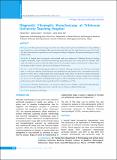Please use this identifier to cite or link to this item:
https://hdl.handle.net/20.500.14356/1356Full metadata record
| DC Field | Value | Language |
|---|---|---|
| dc.contributor.author | Pant, Pankaj | - |
| dc.contributor.author | Joshi, Aishana | - |
| dc.contributor.author | Bam, Niraj | - |
| dc.contributor.author | Das, Santa Kumar | - |
| dc.date.accessioned | 2023-05-08T10:08:41Z | - |
| dc.date.available | 2023-05-08T10:08:41Z | - |
| dc.date.issued | 2019 | - |
| dc.identifier.citation | PantP., JoshiA., BamN., & DasS. K. (2020). Diagnostic Fibreoptic Bronchoscopy at Tribhuvan University Teaching Hospital. Journal of Nepal Health Research Council, 17(4), 512-515. https://doi.org/10.33314/jnhrc.v17i4.2209 | en_US |
| dc.identifier.issn | Print ISSN: 1727-5482; Online ISSN: 1999-6217 | - |
| dc.identifier.uri | http://103.69.126.140:8080/handle/20.500.14356/1356 | - |
| dc.description | Original Article | en_US |
| dc.description.abstract | Abstract Background: Fibreoptic bronchoscopy is one of the most vital procedures performed in health care setting. Globally, several studies have reported findings of fibreoptic bronchoscopy while only few studies have been reported in Nepal. The aim of this study was to perform two year retrospective analysis of diagnostic fibreoptic bronchoscopy at tertiary referral centre. Methods: A hospital based retrospective observational study was conducted at Tribhuvan University Teaching Hospital, Kathmandu, Nepal. Consecutive bronchoscopy reports from June 2017 to May 2019 were included. Data entry and analysis was done in Microsoft Office Excel 2010. Descriptive statistics was performed to obtain clinico-demographic profile of patients, indications and findings of bronchoscopy. Results: A total of 238 bronchoscopy procedures were analyzed. Mean age of patients was 55.02 years with range from 15 to 84 years. Majority of bronchoscopy were performed in male patients (58%). One hundred and twelve patients (47.05%) had no endobronchial lesion. Endoscopically visible tumor was the most common abnormality seen in 57 (23.9%) patients with highest prevalence in 55-65 years followed by extrinsic compression of bronchial tree seen in 13 (5.5%) patients. Bronchioalveolar lavage for routine examination (n=207) was the most commonly performed procedure during bronchoscopy followed by bronchial biopsy (n=55). Conclusions: Fibreoptic bronchoscopy is an extremely useful tool for evaluation of tracheobronchial pathology. Baseline bronchoscopic findings from tertiary referral centre in Nepal was obtained in this study. Keywords: Bronchoscopy; fibreoptic. | en_US |
| dc.language.iso | en | en_US |
| dc.publisher | Nepal Health Research Council | en_US |
| dc.relation.ispartofseries | Oct-Dec, 2019;2209 | - |
| dc.subject | Bronchoscopy | en_US |
| dc.subject | Fibreoptic | en_US |
| dc.title | Diagnostic Fibreoptic Bronchoscopy at Tribhuvan University Teaching Hospital | en_US |
| dc.type | Journal Article | en_US |
| local.journal.category | Original Article | - |
| Appears in Collections: | Vol. 17 No. 4 Issue 45 Oct-Dec 2019 | |
Files in This Item:
| File | Description | Size | Format | |
|---|---|---|---|---|
| 2209-Manuscript-13238-1-10-20200121.pdf | Fulltext Download | 656.39 kB | Adobe PDF |  View/Open |
Items in DSpace are protected by copyright, with all rights reserved, unless otherwise indicated.
